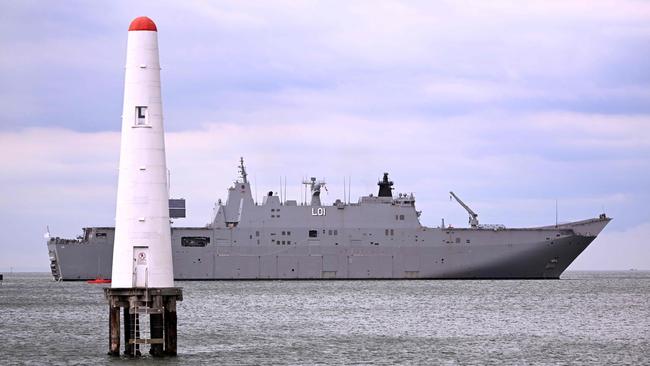
A battle has broken out over the future of Australia’s top shipbuilder Austal amid concerns the $1bn-plus takeover would fail to win regulatory clearances due to defence sensitivities.
South Korea’s Hanwha Group lobbed a bid for the business that counts billionaire Andrew Forrest as a 19.6 per cent shareholder in recent weeks, but it was not disclosed by the board because of the expectation it would not be cleared for approval by the US and Australian governments.
Austal is a major builder of naval ships for the defence forces in the United States and Australia, with the Commonwealth government recently awarding the business a large pipeline of work as it bolsters its defence capabilities to respond to a more assertive China.
Austal is building 10 patrol boats for the Royal Australian Navy and reached an initial deal in November to build 18 landing craft vessels for the Australian Army.
But more than 80 per cent of its revenue comes from the United States, where it builds ships for its defence force and requires approval from the Pentagon for executives from the parent company to make site visits.
Hanwha confirmed its bid on Tuesday, following a report in DataRoom, as did Austal, saying the South Korean company had offered $2.825 per share, equating to a market value of just over $1bn.
Austal shares closed more than 10 per cent higher on the news to $2.43 after they closed in the last trading session at $2.20.
Manager of the Anzac Ship Project undertaken during the 1990s, former Transfield Services chairman Tony Shepherd, said Austal was one of the last remaining ship builders in Australia, other than the one in Adelaide.
“We are a country dangerously exposed to being short of manufacturing capability,” Mr Shepherd said.
“If we are importing, we are at the end of a very long and delicate supply chain.”
While South Korea was an ally, the US was a closer ally.
“Even if (a company from) the US buys it, we don’t want them manufacturing for us. We need to manufacture them here.”
Hanwha Group said its offer was indicative, through a scheme of arrangement and subject to due diligence.
“The Austal board, together with its advisers, has considered the indicative proposal in detail and engaged with Hanwha in relation to whether the transaction described in the indicative proposal would obtain the regulatory approvals in Australia and the USA to enable it to proceed,” Austal said in its statement.
“At present, Austal is not satisfied that these mandatory approvals would be secured. However, the company is open to further engagement if Hanwha is able to provide certainty on whether a transaction would be approved.”
But Hanwha said this was “baseless “.
Hanwha said it brought important capabilities and investment to support Austal’s business and local Australian communities and was aligned with government objectives in Australia, the US and South Korea.
“There is no foundation of the claim that the Foreign Investment Review Board (FIRB) would reject Hanwha’s acquisition of the company,” David Kim, executive vice president at Hanwha said.
Hanwha said it was respectful of the FIRB regulatory approval process, but was confident in its ability to obtain FIRB approval for the transaction.
“Hanwha has already obtained FIRB approval for prior investments in Australia and has a proven track record of investment in Australia’s defence industrial base, being the contracted supplier of infantry fighting vehicles, self-propelled howitzers and ammunition resupply vehicles with significant investment in a Geelong manufacturing facility that employs local workers.”
Hanwha said it was a credible buyer with a highly competitive offer that would strengthen alliances, support government priorities by accelerating delivery of critical programs, and allow Australia to keep sovereign shipbuilding capabilities in Henderson, Western Australia.
The company had more than 50 years of shipbuilding experience and would be a long-term partner.
In February, the federal government said it would spend billions more dollars over the next decade to expand its surface fleet to its largest size since World War II following a wide ranging review.
The blueprint called for 26 major surface vessels, including destroyers and frigates, plus 25 minor war vessels.
Last year, the Australian government awarded Hanwha a multibillion-dollar contract to build 129 infantry-fighting vehicles, ranking it one of the largest capability acquisition projects in the history of the country’s army, the Wall Street Journal reported.
The Forrests’ private investment vehicle Tattarang is the biggest shareholder in Austal, an ASX-listed shipbuilder, with a 19 per cent stake.
Last year the billionaire visited Austal’s facility in Alabama, where the USS Canberra – commissioned in Sydney– was built. He earlier attended meetings at the White House along with business briefings in Boston and New York.




To join the conversation, please log in. Don't have an account? Register
Join the conversation, you are commenting as Logout